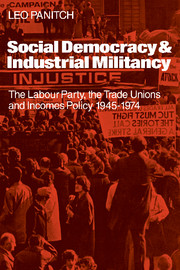 Social Democracy and Industrial Militiancy
Social Democracy and Industrial Militiancy Book contents
- Frontmatter
- Contents
- Preface
- List of Abbreviations
- Introduction
- 1 The 1945 Labour Government: the mixed economy and wage restraint
- 2 Incomes policy and Labour in opposition
- 3 The voluntary incomes policy agreement
- 4 The devaluation of voluntarism
- 5 The politics of wage freeze
- 6 The statutory incomes policy – Labour Government versus labour movement
- 7 ‘In place of strife’
- 8 Industrial militancy and political stagnation
- Conclusion
- Appendixes
- Notes
- Index
2 - Incomes policy and Labour in opposition
Published online by Cambridge University Press: 07 October 2011
- Frontmatter
- Contents
- Preface
- List of Abbreviations
- Introduction
- 1 The 1945 Labour Government: the mixed economy and wage restraint
- 2 Incomes policy and Labour in opposition
- 3 The voluntary incomes policy agreement
- 4 The devaluation of voluntarism
- 5 The politics of wage freeze
- 6 The statutory incomes policy – Labour Government versus labour movement
- 7 ‘In place of strife’
- 8 Industrial militancy and political stagnation
- Conclusion
- Appendixes
- Notes
- Index
Summary
1951–9: a policy in search of support
The political significance of the breakdown of the wages policy in 1950 was that the ability of the Labour Party, as a national party, to integrate the unions with regard to the most difficult structural problem facing the British economy was considerably diminished. Party manifestos during the 1950s did not resurrect wages policy proposals and Party leaders themselves generally avoided specific reference to a revival of the policy. This was an indication of the differential power the trade unions have vis-à-vis the Labour Party: their influence is greater in framing an electoral programme than in determining the actual policy of a Labour Government. Although many of the conflicts that divided the Party during this period in opposition were not unconnected with the questions the wages policy had raised, differences on this issue were not a prime focus of controversy themselves. The reasons for this were not only the result of factors internal to the Party and the unions; in part it was attributable to the fact that, in general, Conservative Governments in the 1950s were agnostic about a national wages policy, and thus external pressure on the Party to develop a counter-policy in opposition was not great. It was only when the Conservatives experienced in the early sixties their own ‘conversion’ to indicative planning and incomes policy that Labour returned to the question with some relish, offering the electorate an incomes policy which, ironically in view of both earlier and later developments, was presented as a showpiece of Party–union concord.
- Type
- Chapter
- Information
- Social Democracy and Industrial MilitiancyThe Labour Party, the Trade Unions and Incomes Policy, 1945–1947, pp. 41 - 62Publisher: Cambridge University PressPrint publication year: 1976
- 2
- Cited by


